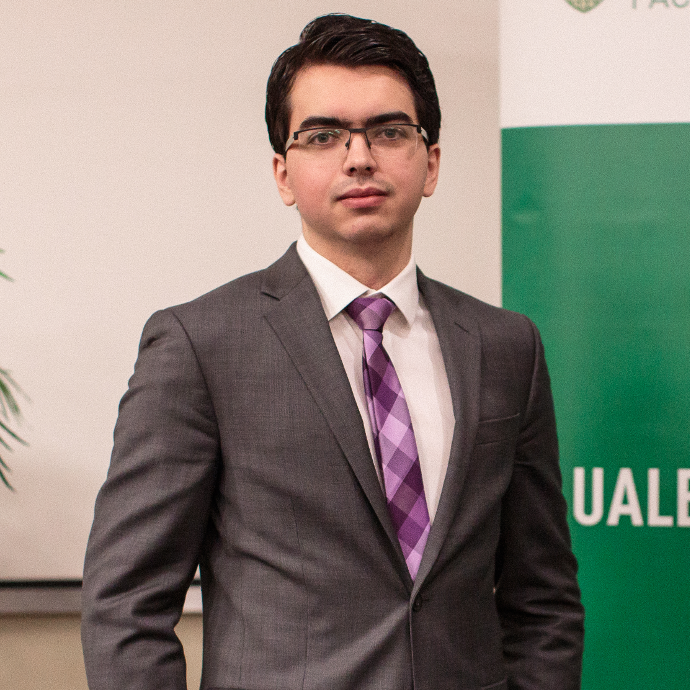
Alec McIlwraith-Black, co-president of the Law and Business Association
Lawyers, students, legal academics, computer science and artificial intelligence experts and others will discuss and debate not only how technology is transforming the delivery of legal services but what the ethical consequences might be, during the 2019 Legal Innovation Conference, Pushing the Limits of Innovation, at the University of Alberta.
The conference takes place at the Timms Centre for the Arts on the University of Alberta campus from 8:30 a.m. to 3:00 p.m., on Friday January 18. Hosted for the second year in a row by the Faculty of Law's Office of the Dean, in partnership with the student-led Law and Business Association, this year's conference explores the theme Pushing the Limits of Innovation. Speakers and panelists will explore cybersecurity, the ethics of innovation, and innovations in legal scholarship, with experts in technological innovation drawn from legal firms across Canada offering their perspectives.
"Technology has been transforming legal practice for a generation, permitting more efficient delivery of legal services and changing the legal workplace," said Paul Paton, dean of UAlberta Law. Paton served as Reporter to the American Bar Association's Ethics 20/20 Commission, which from 2010 to 2013 explored how globalization and technology might require changes to ethics rules and resources for lawyers across the United States.
"But with the next wave of innovation already in place, including predictive artificial intelligence and AI "smart machines" that permit non-lawyers to offer what traditionally have been viewed as legal services, legal professionals have questions about how the most imminent changes will transform bedrock practices and how they will not. The speakers chosen for this year's conference have answers to those questions, as well as what the new questions should be," Paton said.
The conference also importantly features leading women in legal innovation, a dimension needing attention given traditional underrepresentation of women in tech, said Paton.
"Working with our students, last year's sold-out conference was founded to give shape to these important discussions. I'm very proud that the student Law and Business Association continues to take the lead."
The one-day conference will begin with a keynote address by Robert Garmaise, the chief innovation officer at Fasken, a Canadian business law firm practising on four continents. He will address whether there are areas of law that are innovation-proof, where innovation might be constrained by statute or common law, and if innovation is happening with an appropriate level of accountability.
During a presentation entitled The T-Shaped Lawyer, Vancouver-based lawyer Lisa Culbert will present a model of legal education and professional development that encourages students and practitioners to attain a breadth of knowledge so they can collaborate across many disciplines, including technology, analytics and business.
A panel discussion on cybersecurity and cybercrime will delve into the risks inherent when law firms embrace technological innovations, and the legal issues related to regulatory response from governments and surveillance in society.
Panellists will include Patricia Kosseim, a national leading expert in privacy and access law, and counsel in the Privacy and Data Management Group and co-leader of the AccessPrivacy platform at Osler's Ottawa office. Steven Devenney, currently a student-at-law at Insight Law LLP, will contribute his expertise as a former intelligence officer with the Canadian Armed Forces.
During the Where Is Innovation Happening? panel, Canadian lawyers who have experience in innovation and the potential disruption that accompanies it will offer advice on how current and future lawyers can prepare themselves to survive and thrive in an innovation-driven environment.
The conference will conclude with a fireside chat in which Dean Paton will discuss the ethics of innovation with Kate Simpson, national director of knowledge management with Bennett Jones LLP, based on the concepts and ideas emerging during the day's panels and keynote address.
The conference should be especially interesting to law students who are preparing to enter the legal industry as it's being reinvented, said Alec McIlwraith-Black, co-president of the Law and Business Association.
"It gives students the chance to hear from people with deep expertise across a broad variety of topics in legal innovation, all of which are going to be important to some degree in their futures as lawyers."
Attendees at the 2019 Legal Innovation Conference are encouraged to use #UAlbertaLawInnovation.